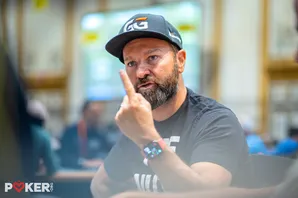Shortly after the 2024 WSOP Paradise festival ended, GGPoker ambassador Daniel Negreanu called for some rule changes to poker on his X account.
He put forward four points, including banning sunglasses, face coverings, and card protectors. The one that caused the most debate, however, was about the new trend of poker players leaving a chip behind instead of moving all in. And there's been so much debate about his post that Negreanu has now expanded on his point in a 20-minute video on his YouTube channel, saying, "This rant is all about why I believe it's bad for the game and ways it could be avoided."
You can watch it all in the video above. Negreanu's original post has now had over 800K views on Twitter, with 731 comments (from some of the biggest names in the game), 203 reposts, and over 6K likes.
One chip behind – the legal angle
So what is the issue with leaving a single chip behind and why do players do it?
Having a chip behind, no matter how small, means that you're still in the tournament. If things don't go your way in the hand and you're set all-in, you can stall and potentially grab yourself a pay jump. There are also incidents when opponents have called and flipped their cards, assuming the other player had moved all in. That then gives them the option to pull what Negreanu calls a "legal angle" and fold, when that was never your intention in the hand. Negreanu cited two examples from the recent Paradise festival where this exact scenario happened.
The second hand involved Shaun Deeb leaving 15K behind on a final table. A non-pro player called and turned his hand over and after the flop, Deeb saw he was drawing virtually dead and folded his hand. He then won the big blind ante and ended with two big blinds shortly after.
Beyond the player still being alive in the tournament, Negreanu went on to say that it has an effect on the gameplay, with other short stacks on the table. He also claimed this could lead to "legal collusion" with a big stack or chip leader purposefully keeping short stacks in to maintain ICM pressure on the other small-to-mid stacks.
Negreanu was quick to point out he wasn't accusing any player of cheating. "Like I said, first of all, the words angle shoot specifically mean it's within the rules because if it's not in the rules, it's just cheating. Angle shooting is pushing up against the rule that might be flimsy, not so good, or, you know, you can use it as an opportunity to take advantage of people."
He also said that the game would be certifiably better if everyone chose not to do it – both for the players and for viewers. Given that's not what's going to happen, Negreanu put forward a couple of solutions, including one that says if you put more than 90% of your stack in, you're considered all-in.
He also pointed to a potential solution from Tom Dwan on X, where the player who calls what he thought was an all-in is given the option by the floor to change to a raise to move the other player all-in.
Here's a selection of comments from other pros about the issue. Some players are saying it's a non-issue but talking these things through in a public forum has to be good for the game. And Negreanu has the sway to ensure that a spotlight is put on issues that he thinks are making the game worse.
And talking about stalling...
Negreanu compared the issue to stalling, which became a real problem in the game and led to the introduction of shot clocks.
They have improved the issue but Negreanu had stuff to say here, too. "There is a far better option. On GGPoker, for example, all the time you use leading up to a final table will dictate how much time you actually get when you're at a final table, so if you wasted a bunch of time, you're going to be on a short clock. If you saved up your time, you're going to have more time to make your decisions.
"And then at the final table, it's not levels by time; it's levels by number of hands. So level 17, 25 hands, play the hands, and you know, move on. That also helps with another thing too. At the final table, sometimes when there's a couple of short stacks in, some people have an incentive to say, 'Oh, the blinds are going up, I want that short stack to pay the higher blind so I'll stall and make sure that they do.'"
Negreanu explained that a chess clock would punish the people that take the time and not people like him who act fast unless they have a decision to make. He used the example of a player who uses the full 30 seconds for every decision and doesn't get penalized, compared to Negreanu taking five seconds for each decision but burning three time banks over one big decision. Over ten decisions, the first player has used five minutes and used zero time banks. Negreanu would have taken just over three minutes and burned through three time banks.
What do you think of the issues Negreanu has raised? Let us know in the comments below.


















